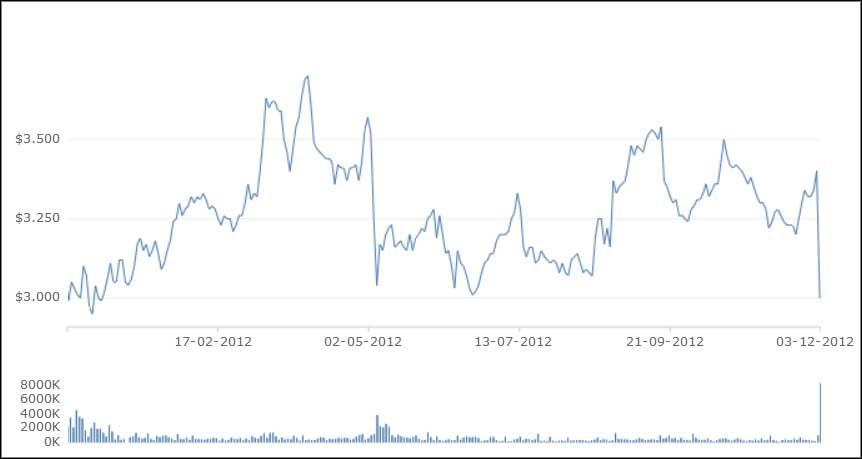Chorus' annual earnings would be slashed by as much as 40% if the competition regulator goes ahead with draft plans to steeply cut what the telecommunications network operator can charge for access to electronic switchgear on its ageing copper lines.
The telecommunications network operator has slammed the Commerce Commission's draft regime on pricing for unbundled bitstream access (UBA) services, saying it could reduce annual earnings before interest, tax, depreciation and amortisation by $150 million to $160 million from December 2014, based on existing connections.
Wellington-based Chorus had $399 million ebitda in 2012.
Its shares closed down 14.41% [NZX:CNU] or 49 cents to $2.90 - three cents below its December IPO price 12 months ago.
Investor outraged
"The UBA decision confirms the Commerce Commission is wholly at odds with the government's IT policy," angry Chorus investor Aaron Bhatnagar told NBR ONLINE.
"Taxpayers should be outraged the unpredictable regulatory environment will distort the national fibre rollout approved by NZ voters," he said.
"Investors can only conclude it is unsafe to invest in New Zealand companies that have ComCom oversight, even when those companies are tasked with delivering on the most important policies of the government."
Dividends, entire business model under threat
"Today's decisions are a significant step backward," chief executive Mark Ratcliffe says in a statement. "Shifting the relativity of copper and fibre pricing will discourage that transition."
Mr Ratcliffe noted that while the decision announced today was a draft only, if it goes ahead it "could require Chorus to fundamentally rethink its business model, capital structure and approach to dividends."

Click to zoom. Chorus peformance since its Dec 2011 IPO (Source: NZX.com). Today's 11% fall echose a similar dive in May after the Telecommunications Commissioner's draft ruling was released.
Political push
The Chorus boss seized on comments by Amy Adams earlier today that it was difficult for the Commissoner to set pricing, because New Zealand's enviroment (with network division Chorus split from the now retail-focused Telecom) was relatively unique.
"We note the Minister’s comments and we will be talking to the Crown about the apparent policy disconnect, and Chorus’ role in the UFB programme," Mr Ratcliffe said.
"At the very least, we believe that the government should immediately look to bring forward the regulatory review already required by legislation in 2016, in order to bring about a sustainable framework next year that will support the UFB vision."
Expect a lot of back room maneuvering and lobbying before the level of the proposed UBA cuts are finalised in June next year.
And Chorus investors should hold onto hope. The 3.85% UCLL cut finalised today was much milder than a draft determination by Dr Gale's predecessor, Ross Patterson, which called for a 20% cut.
Today's cuts, and the proposed cuts
The commission set the new unbundled copper local loop (UCLL) rates at a geographically averaged price of $23.52 per month per line from December 1, 2014, a 3.85% reduction to the prices set in 2007.
Urban UCLL prices have been set at $19.08 and rural at $35.20, effective immediately. UBA prices will be provisionally set at $32.45 per month, effective from December 1, 2014, from the existing $44.98.
The regulator's softer regime for pricing the unbundled copper local loop (UCLL) would trim annual ebitda by about $20 million, Chorus says.
Wholesale prices for access to the copper lines were averaged as a result of legislation enabling Telecom to carve out its Chorus unit last year, something that annoyed rival telecommunications companies, who sayit will lift their costs.
At the time of the enabling legislation, Ministry of Economic Development officials downplayed concerns about the impact on copper-line prices, saying it wasn't "deemed significant" and that any increase in UCLL pricing may "have the positive impact of encouraging more investment and innovation on fibre".
Chorus shares sank 12% to $2.98 when they resumed trading after being halted for the announcement.
Among concerns is the potential for much lower copper network pricing to deter investment and uptake of ultra-fast broadband, using the government-subsidised fibre network being laid throughout the country.
Mr Ratcliffe says the company will take the matter up with the government "about the apparent policy disconnect, and Chorus' role in the UFB programme" with a view to at least bringing forward a regulatory review to foster the fibre environment.
Chorus was spun out from Telecom as a separately-listed company last year to free up the telecommunications company from its regulatory burden and allow the network operator to successfully win a billion-dollar subsidy to build a nationwide fibre network and rural broadband system.
Some 80% of the network company's revenue is still derived from the ageing copper network and is subject to the Commerce Commission's pricing review.
At a media briefing in Wellington, Telecommunications Commissioner Stephen Gale today stressed the UBA pricing regime was a draft decision and would go out to industry for consultation with a view to making a final ruling in June.
If telecommunications companies are unhappy with the final benchmark, they can request the regulator use a cost-modelling approach to determine pricing instead, he said.
"This (UBA) price when finally decided in two years may have a significant impact on Chorus' revenue."
The UCLL service lets telecommunication companies use the copper network between an exchange and an end-user's premises to offer their own voice and broadband services.
UBA gives access to Chorus's electronics, software and transport over the network, meaning telcos do not have to build their own.
With reporting by BusinessDesk.
Chris Keall and Paul McBeth
Wed, 11 Jul 2018



